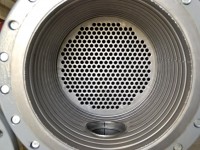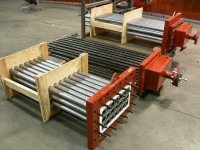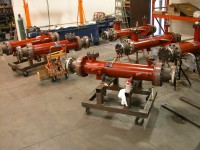Tantalum is the most corrosion-resistant metal in common use today. It is inert to practically all organic and inorganic compounds. Its corrosion resistance is very similar to glass, as both are unsuitable for use in hydrofluoric acid and strong hot alkali applications. For this reason, Tantalum is often used with glass-lined steel Reactors as patches, Dip Tubes, Piping and Overhead Condensers.
Tantalum is inert to sulfuric and hydrochloric acid in all concentrations below 300°F. Attack up to 400°F is not significant and Tantalum is in common use up to 500°F. Tantalum is not attacked by nitric acid in concentrations up to 98% and temperatures up to at least 212°F. Tantalum has proven itself to be totally inert in many applications. Some Heat Exchanger installations have been in continuous use for over 40 years in multi-product research environments without so much as a gasket change.

Tantalum Shell and Tube Vaporizer, 1225 Sq. Ft. 24″ Diameter x 240″ Long, includes Tantalum Lined Bonnets
Wide Range of Tantalum Applications
The corrosion resistance, heat transfer properties and workability of Tantalum make it a perfect construction material for a wide range of equipment and applications. Common types of Tantalum fabrication are Heat Exchangers, Condensers, Columns or Towers, Reactors, Helical Coils, Pipe Spools, Valve Linings and a variety of other components exposed to extremely corrosive fluids. Applications of Tantalum can be fabricated into most TEMA-type design Shell and Tube Heat Exchangers and Bayonet Heaters for chemical, petrochemical and pharmaceutical applications.
Applications of Tantalum should be considered wherever corrosion is a factor and long-term benefits of reduced downtime, increased life expectancy and profitability is important. For many applications, Tantalum is the only reasonable choice.
Tantalum Outperforms Other Materials

Tantalum Bayonet Heat Exchanger Horizontal, Carbon Steel Stinger Tube Bundle
Today’s global economy means increased competition. The control of cost including manufacturing efficiency, plant equipment costs and maintenance are paramount to survival. Chemical producers have recognized that increasing pressure and temperature increases efficiency in many applications. This also increases corrosion problems which Tantalum can handle.
Tantalum and Steel Pickling Applications
The largest cost of all is often maintenance and downtime. Industries from steel pickling to pharmaceutical have recognized that to stay competitive you first have to stay in production. It is no coincidence that the world’s best, most progressive, and most profitable steel pickling and pharmaceutical companies standardize on Tantalum equipment to solve their corrosion problems.
The relatively high initial cost of Tantalum equipment is offset by its extremely low corrosion and long life-time. Life cycle costs and manufacturing efficiencies need to be evaluated for a globally competitive manufacturing facility. Applications of Tantalum in process equipment meet all these challenges.
|
CORROSION RESISTANCE OF TANTALUM |
|||||||||||||||||||||||||||||||||||||||||||||||||||||||||||||||||||||||||||||||||||||||||||
|---|---|---|---|---|---|---|---|---|---|---|---|---|---|---|---|---|---|---|---|---|---|---|---|---|---|---|---|---|---|---|---|---|---|---|---|---|---|---|---|---|---|---|---|---|---|---|---|---|---|---|---|---|---|---|---|---|---|---|---|---|---|---|---|---|---|---|---|---|---|---|---|---|---|---|---|---|---|---|---|---|---|---|---|---|---|---|---|---|---|---|---|
|
|||||||||||||||||||||||||||||||||||||||||||||||||||||||||||||||||||||||||||||||||||||||||||
Please see our Technical Resources section for detailed corrosion resistance charts.
Tantalum Fabrications
TITAN regularly designs, engineers and fabricates the following types of Tantalum custom process equipment:
- Tantalum Heat Exchangers
- Tantalum Columns
- Tantalum Condensers
- Tantalum Reactors
- Tantalum Pressure Vessels
- Tantalum Piping Systems
- Tantalum Pipe
- Tantalum Spargers
TITAN does not purchase any materials that are known to come from conflict resources. See our Conflict-Free Materials Sourcing Policy.
Tantalum Applications
Tantalum serves many different applications in these industry categories:
- Pharmaceutical
- Steel Finishing
- Pesticides
- Herbicides
- Organics
- Inorganics
- Fine Chemicals
Tantalum is very well suited to many industrial processes. The following are some of the environments in which Tantalum is fully resistant*.
|
|
|
For a general guide on corrosion resistance, temperatures and concentrations please see TITAN’s publication, “Corrosion Resistance of Metals in Various Chemical Media” for additional information.*
*Please Note: Final selection of material must be based on actual evaluation of the metal in the corrosive medium under study.
Is Tantalum a good choice for your application? Ask TITAN.
TITAN’s world-class team works together with leading mill metallurgists to solve the most challenging corrosion, application, mechanical or thermal design issues. Consult with us if you have need for unique Tantalum equipment. TITAN can also quickly let you know if another metal might better suit your application. Contact us by phone at (805) 487-5050 or toll-free (877) 487-5050 or email info@titanmf.com. We’re happy to help!
Bongkar Rahasia Menang Main Slot Online: Apa yang Pengaruhin dan Gimana Cara Maksimalin Peluang Menang
Main slot online biroslot.link sekarang udah jadi salah satu hiburan favorit banyak orang—mulai dari yang cuma iseng-iseng doang, sampai yang beneran seriusin hobi ini. Gimana enggak, tampilannya kece, suaranya asyik, dan sensasi menangnya tuh bikin deg-degan!
Tapi, di balik semua keseruannya, banyak yang masih bingung: sebenernya apa sih yang bikin seseorang bisa menang pas main slot online biro slot? Dan ada gak sih cara buat ningkatin peluang menang? Nah, di artikel ini, kita bakal kupas tuntas semua hal yang bisa ngaruh ke kemenangan slot, plus tips dan trik biar lo bisa main lebih oke dan lebih cuan. Yuk langsung aja!
1. Kenalan Dulu Sama RNG, Si Otak Dibalik Slot
Pertama-tama, sebelum ngomongin menang-menangan, lo harus tau dulu soal yang namanya RNG alias Random Number Generator di game slotvipgg.link.
- RNG ini semacam sistem algoritma yang bikin hasil dari tiap spin itu acak banget.
- Sistem slotvip gg terus-terusan ngeluarin angka, bahkan pas lo lagi nggak main. Dan pas lo pencet tombol “putar”, si RNG langsung milih angka acak yang sesuaiin sama posisi simbol di layar.
Artinya apa? Hasil tiap putaran slothoki gak bisa ditebak, gak bisa diatur, apalagi dimanipulasi. Jadi kalo lo mikir bisa nemuin pola, atau nunggu giliran menang, mending stop dari sekarang. Karena RNG itu bener-bener pure keberuntungan.
2. Pahami yang Namanya RTP, Biar Gak Zonk Terus
Walaupun hasil putaran acak, ada satu hal yang bisa lo gunain buat milih slot agendunia55 yang lebih menguntungkan, yaitu RTP (Return to Player).
- RTP adalah presentase uang yang, secara teori, bakal dibalikin ke pemain agendunia55.top dalam jangka panjang.
- Misalnya, kalau RTP-nya 96%, berarti dari total taruhan 100 ribu, sekitar 96 ribu bakal balik ke pemain. Tapi inget ya, ini hitungan jangka panjang, bukan per sesi main!
Slot indobetslot88.net dengan RTP tinggi lebih berpeluang ngasih lo kemenangan kecil tapi sering. Jadi makin tinggi RTP, makin oke buat dimainin—khususnya buat lo yang pengen main santai tapi tetap dapet hasil.
3. Volatilitas Slot: Pilih Sesuai Gaya Main Lo
Selain RTP, satu lagi faktor penting yang sering dilupain orang: volatilitas.
- Slot indobet.sbs dengan volatilitas rendah biasanya kasih menang kecil tapi sering.
- Slot dengan volatilitas tinggi jarang kasih menang, tapi sekalinya dapet, hadiahnya bisa gila-gilaan.
Cocokin sama gaya main lo, jangan maksain main di slot high risk kalau budget lo lagi tipis. Yang penting enjoy dan sesuai kapasitas.
4. Faktor Keberuntungan: Suka Nggak Suka, Ini Penentunya
Jangan pernah lupa: main slot indobet itu 100% permainan hoki.
- Gak ada strategi pasti yang bisa jamin lo menang.
- Bahkan pemain baru indobet.cfd bisa aja langsung menang besar di putaran pertamanya.
Justru ini yang bikin slot seru: semua orang punya peluang yang sama.
5. Bonus dan Fitur Khusus: Jalan Pintas Buat Tambah Cuan
Slot zaman sekarang bukan cuma soal putar-putar gulungan. Banyak fitur keren slotvip yang bisa bantu lo menang tanpa harus nambah taruhan. Nih, beberapa fitur yang sering muncul:
- Free Spins: Putaran gratis yang dikasih slotvip.bid pas lo dapet simbol tertentu. Kadang dikasih multiplier juga.
- Wild Symbol: Bisa gantiin simbol lain biar lo dapet kombinasi menang.
- Scatter Symbol: Bisa ngasih free spin atau menang langsung meski posisinya acak.
- Mini Games: Slot tertentu punya bonus game interaktif dengan hadiah gede.
Selalu baca dulu fitur slot sebelum main biar gak rugi peluang.
6. Manajemen Uang: Main Pake Otak, Bukan Emosi
Biarpun eslot.cfd game hoki, yang namanya ngatur uang itu tetap penting banget.
- Tentuin dulu berapa budget buat main hari ini. Jangan lebih, jangan kurang.
- Hindari taruhan maksimum kecuali lo ngejar jackpot progresif eslot.
- Bagi sesi main, biar gak habis semua dalam satu duduk.
Main santai, tahan lama, dan nikmatin prosesnya. Karena makin lama lo bisa main, makin banyak peluang buat menang.
7. Psikologi Pemain: Jangan Main Pas Bete!
Jangan main slot pas lo lagi kesel, panik, atau capek.
- Emosi bikin lo nekat ambil keputusan yang salah.
- Main pas marah bikin lo maksa ngejar balik kekalahan.
Coba main pas mood bagus dan anggap aja hiburan. Jangan nyari duit lewat slot. Serius deh, itu bukan jalannya.
8. Jackpot Progresif: Gede Banget, Tapi Susah Didapetin
Slot gemoy138.link dengan jackpot progresif itu hadiahnya bisa sampe miliaran. Tapi ada syaratnya:
- Biasanya lo harus main di taruhan maksimal buat bisa ikutan jackpotnya.
- Peluang menang kecil, tapi bukan berarti mustahil.
Kalo mau coba, pastiin lo beneran siap rugi juga ya. Jangan paksa modal kecil ngejar hadiah miliaran.
9. Gunain Promo dan Bonus Casino Online
Situs gemoy138 online suka ngasih bonus yang bisa jadi modal tambahan, misalnya:
- Bonus selamat datang.
- Free spin tanpa deposit.
- Cashback mingguan atau bulanan.
Manfaatin semua bonus indowin88jp.top yang masuk akal. Tapi jangan lupa baca syarat dan ketentuannya. Jangan sampe menang tapi gak bisa ditarik karena salah paham.
10. Ikutin Perkembangan Dunia Slot
Dunia slot terus berkembang. Banyak fitur-fitur baru yang muncul tiap bulan.
- Megaways: Cara menang di indowin88jp bisa sampai ribuan kombinasi.
- Cluster Pays: Simbol berdekatan bisa menang meski gak sejajar.
- Gamifikasi: Ada misi dan achievement yang bikin main makin seru.
Jangan ketinggalan info. Cek berita atau review slot biar tahu mana game terbaru yang lagi rame dan worth it buat dicoba.
Tips Main Slot Biar Gak Zonkers
- Pilih slot mpo4d terpercaya dengan RTP tinggi.
- Cocokin volatilitas sama gaya main lo.
- Manfaatin fitur bonus dan promosi casino.
- Jangan main pake emosi, dan selalu kelola uang dengan bijak.
- Ikutin tren slot biar gak bosan dan makin punya peluang baru.
Main slot itu harusnya bikin happy, bukan bikin stress. Kalau lo bisa nikmatin proses mainnya, kemenangan itu bakal jadi bonus yang manis. Selamat main dan semoga hoki selalu berpihak sama lo!

